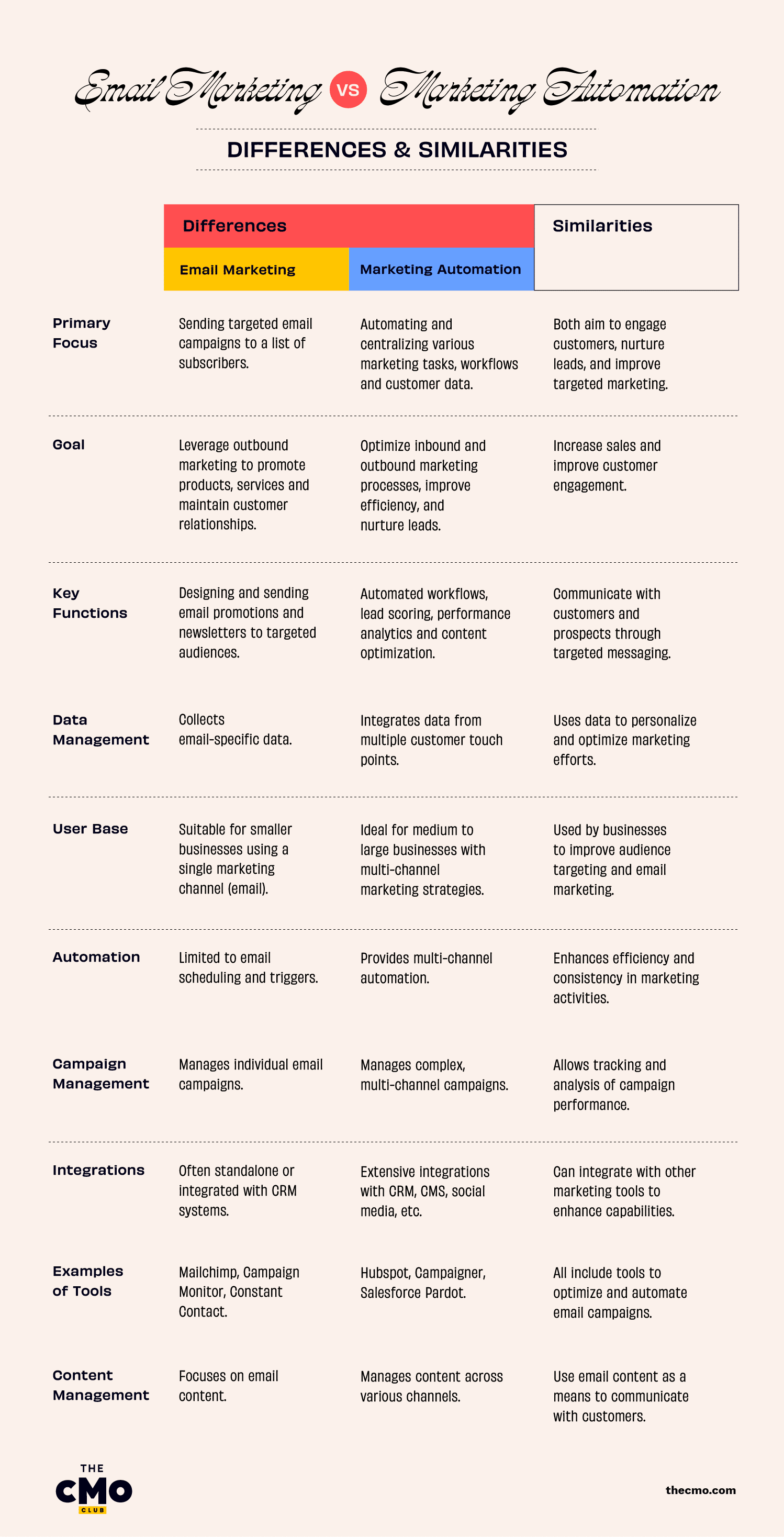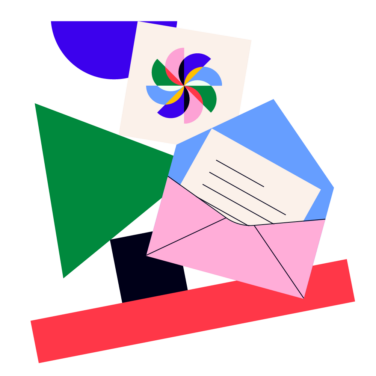If you're relying on email marketing tools when your business actually needs marketing automation software, you’re likely leaving growth on the table. But overspending on automation when a solid email marketing strategy would do? That’s a fast track to wasted budget.
Email marketing vs. marketing automation is a confusing comparison, especially when so many tools and terms overlap. In this guide, I’ll walk you through the key differences, when to use each, and how to align your choice of email marketing tools and marketing automation software with your actual business needs, so you can stop guessing and start scaling.
What is Email Marketing?
Email marketing is a direct marketing strategy that uses email to promote products or services, build relationships with potential customers, win back lost customers, and keep audiences engaged. It is one of the oldest digital marketing strategies and continues to be one of the most effective, producing an average ROI of $36 for every $1 spent.
With email marketing campaigns, you get a cost-effective and highly measurable way to reach your audience and achieve your marketing goals. Email marketing tools are designed to support all things email and often include:
- Campaign and message delivery automation
- Pre-built email templates
- Design tools
- Email marketing analytics
Plus, it's a favored strategy for B2C and direct-to-consumer (DTC) business models, as it provides a direct communication channel with customers. However, the limitations of this software arise when more complex customer journeys are involved, as is common in B2B marketing.
This is where marketing automation comes in, supporting businesses with longer sales cycles and omnichannel marketing strategies. In the next section, we'll take a closer look at marketing automation.
Who is email marketing best for?
Email marketing works best for lean teams and early-stage SaaS companies looking to build consistent outreach and cost-effective nurture campaigns.
As I mentioned earlier, email delivers a high ROI compared to many other marketing channels, and may be the reason why 64% of small businesses rely on email to reach customers (Campaign Monitor, 2023).
This matters because choosing the right tool at the right stage helps you execute campaigns with greater speed and impact. Explore email marketing automation tools that support segmentation and automation if you're looking for direct, measurable results without a complex setup. Use them to refine your outreach and test nurture campaigns before scaling into more advanced systems.
What is Marketing Automation?
Marketing automation is using software and tools to automate repetitive marketing tasks across multiple channels. Think of it as a central hub for all your marketing activities. Here, you move beyond email to consider all the different customer interaction paths.
Most marketing automation platforms the following features:
- Automated campaign delivery across all marketing channels
- Advanced audience segmentation and personalization
- Social media management and social listening tools
- Lead management features (lead generation, lead scoring, lead nurturing)
- Robust customer segmentation and customer journey data
Marketing automation platforms also now come equipped with machine learning and AI features to help your marketing team to:
- Analyze customer behavior
- Make data-driven decisions
- And optimize marketing strategies.
In contrast to email marketing, marketing automation factors in the complete customer experience, from lead capture to customer support.
Who is marketing automation best for?
Automation workflows become essential once you scale beyond simple email campaigns. They help unify cross-channel operations, personalize customer journeys, and track performance through clear metrics.
Companies that use marketing automation see a 451% increase in qualified leads. What's more, they can save 12.2% on marketing overhead (Salesforce, 2024).
In essence, the right automation setup supports growth without adding costs. If you’re seeing success with basic email and want to move to the next level, start by mapping your key customer touchpoints and testing automation workflows tied to specific performance metrics.
Email Marketing vs. Marketing Automation: A Comparison
Here is a summary of how email marketing and marketing automation are different and similar in a few core areas:

Email Marketing vs. Marketing Automation: 5 Key Differences
Scope of Features and Supported Marketing Activities
Email marketing covers a narrower scope of marketing activities than marketing automation. In many ways, email marketing is the starting point for marketing automation.
When managing an email marketing campaign, your scope is limited to managing email lists, building email campaigns, designing content, and analyzing email campaign performance.
Marketing automation broadens the scope, offering a central hub for an omnichannel approach that includes email marketing. It also supports social media marketing, SMS, content personalization, lead scoring, and more.
Lead Management and Customer Data Collection
Another key distinction between email marketing and marketing automation software is the breadth of data collected. Email marketing provides a great starting point for customer data but doesn't factor in the complete customer journey like marketing automation does.
Marketing automation improves customer data collection from multiple channels, which is valuable for B2B marketing. It enables both marketing and sales teams to analyze the entire customer journey and categorize leads, known as lead scoring.
Lead scoring supports personalization at scale, as content and offers can be tailored to each prospect's engagement level. This improves alignment between marketing and sales, ensuring high-priority leads receive relevant communications.
Campaign Complexity and Management
Email marketing is suitable for managing email campaigns with straightforward objectives, but marketing automation excels with more complicated campaigns.
For example, say two prospects receive the same email but take different actions. A marketing automation platform tracks their behaviors and sends tailored follow-up emails. In contrast, email marketing sends both prospects the same second email, regardless of their actions.
Marketing automation can manage complex marketing campaigns thanks to its ability to coordinate data across multiple channels. For instance, marketing automation sheds light on whether a customer has interacted with content on your website, been in contact with your support team, or is active on your social media accounts.
Understanding where and how your customers interact with your business supports the creation of sophisticated marketing strategies and personalized customer experiences. This is particularly useful if your business wants to build an account-based marketing strategy.
Level of Automation
White label email marketing software offer basic automation features such as scheduling emails, setting up autoresponders, and creating simple trigger-based workflows. The automation is often limited to email-related tasks.
In contrast, marketing automation provides advanced automation capabilities that cover a wide range of marketing activities. It can automate complex workflows involving multiple channels, perform lead scoring, track customer interactions across touchpoints, and personalize marketing messages based on user behavior and data.
Price Point and Program Complexity
Email marketing is often the more budget-friendly option, with many free plans available. Training your marketing or sales team on the software also requires less time and resources, making it ideal for smaller businesses or those just getting started with MarTech solutions.
Marketing automation systems, on the other hand, come at a higher price point due to their complexity and advanced features. In many cases, marketing automation software comes at a price point of thousands. These systems are designed for medium to large enterprises that need comprehensive tools to manage multi-channel marketing efforts and a longer sales process.
Email Marketing vs. Marketing Automation: Similarities
Uses Email as a Marketing Channel
Both email marketing and marketing automation use email as a primary channel to reach and engage audiences.
Despite the broader capabilities of marketing automation platforms, email remains central to communicating with prospects and customers due to its effectiveness in delivering targeted messages directly to users' inboxes.
Produces a High Return on Investment (ROI)
Both solutions are known for producing a high return on investment. Email marketing is highly cost-effective, allowing businesses to reach a large audience with minimal expense.
By using customer data and audience segmentation to personalize how you speak to your prospects, marketing automation guarantees ROI to a large extent. In fact, B2B marketers using marketing automation increase their sales pipeline by an average of 10%.
Increases Marketing Efficiency
By automating repetitive tasks and streamlining workflows, both email marketing and marketing automation significantly increase marketing efficiency. This automation allows marketing teams to focus on higher-value activities, such as strategic planning and creative development, rather than manual execution.
Prioritizes Customer Engagement
Both email marketing and marketing automation prioritize customer engagement.
They aim to build and maintain strong customer relationships by delivering valuable, relevant content. Through targeted communications, both strategies seek to nurture leads, drive conversions, and foster long-term loyalty.
Improves Communication and Audience Targeting
While marketing automation is the gold standard for advanced personalization, both email marketing and marketing automation can improve customer communication.
Personalized content delivery and targeted messaging are key email marketing and marketing automation use cases. They enable marketers to streamline communications and produce more content for a broader audience, resulting in more leads.
This improved communication enhances the relevance and effectiveness of marketing campaigns, leading to better engagement and higher conversion rates.
Points to Consider Before Making a Decision
Now that we know the differences between email marketing and marketing automation, let's consider your pre-purchase checklist. These are the key factors to consider before investing in any MarTech solution, whether email marketing or marketing automation.
Your Marketing Goals
As always, all roads can be traced back to your marketing goals. Before investing in marketing software, review your current goals with key stakeholders in your organization. Ask yourselves the following questions:
- What do we hope to achieve by introducing software?
- What areas can we improve in our current strategy?
Understanding your marketing objectives is crucial for navigating the ever-growing list of available solutions. For example, a basic email marketing tool might suffice if your primary goal is to engage customers through email campaigns.
However, a marketing automation platform will be more beneficial if you aim to manage complex drip campaigns and nurture leads through their entire journey.
Your Budget
While you're aligning on goals, it's also important to outline your marketing budget. This will play a large part in whittling down the list of solutions that make sense for your organization.
Assess your budget carefully, considering both the initial cost and potential ROI. Choose a solution that fits within your financial constraints while providing the features necessary to meet your marketing goals.
Remember, basic email marketing tools are generally more cost-effective and can be a great starting point for smaller businesses. In contrast, marketing automation platforms typically come with higher costs but offer more extensive features and capabilities that justify the investment for larger enterprises.
Ease of Use
An extensive list of features does not always equate to increased productivity. Whether you're considering email marketing or marketing automation, looking for software with clean UX and UI design is important.
The usability of a marketing solution affects how quickly your team can learn and use the tool efficiently. A straightforward, easy-to-use platform minimizes training time and helps your team execute campaigns more effectively. If a tool is too complex, it could lead to underutilization and decreased productivity.
Analytics and Reporting Capabilities
Robust analytics and reporting are vital for understanding the effectiveness of your marketing efforts and making data-driven decisions.
Email marketing analytics tools typically offer basic analytics for email campaigns, while marketing automation tools provide comprehensive insights into the entire customer experience, enabling a deeper understanding of customer behavior and campaign performance.
Evaluate any marketing tool's analytics and reporting capabilities before making a decision. Ensure it provides the level of insight you need to optimize your strategies and achieve your marketing goals.
Email Marketing vs. Marketing Automation: Real-World Use Cases
Whether you choose email marketing or marketing automation depends entirely on your specific marketing needs. Below are a few use cases to help you match your business goals, demographics, and sales funnel complexity with the right solution.
Early-Stage Startup Focused on Awareness
Startups often need lightweight tools to build awareness and establish credibility without overcomplicating workflows. Email marketing suits this stage well by offering targeted outreach and measurable engagement without a steep learning curve. When you are just building your audience, focus on list growth and value-driven content to stay top-of-mind.
Mid-Market SaaS With Multiple Demographics
Once you expand to serve multiple customer segments, managing outreach by persona becomes critical. This is where marketing automation platforms shine by allowing segmentation, A/B testing, and journey mapping within a single system. By segmenting your emails, companies have seen a 760% increase in email revenue (Mailmodo, 2025). If you’re seeing varied behaviors across audiences, start by organizing your CRM around firmographics or behavioral data to enable smarter workflows.
Enterprise with Complex Customer Relationship Management Needs
Large teams managing multi-touch journeys and long sales cycles benefit from end-to-end customer relationship management platforms with robust automation. These tools connect marketing and sales data, track leads through the funnel, and deliver advanced reporting. If your data lives across platforms, begin by integrating your CRM with automation tools to streamline lead handoff and improve decision-making.
Email Marketing vs. Marketing Automation: What's Your Choice?
To recap, while email marketing focuses on direct email campaigns, marketing automation tools offer a full suite of tools for managing multi-channel marketing efforts. Always consider your marketing goals, budget constraints, and the software's ease of use before making a purchase decision.
These factors will ensure that your chosen solution aligns with your strategic objectives and enhances your overall marketing effectiveness. Once you're clear on your goals, take a look at our round-up of the best marketing software to find the perfect tool to support your business growth.
Join For More MarTech Insights
Want more of this, sign up for The CMO Newsletter to receive more valuable insights on marketing automation tools, email marketing strategies, and more!


